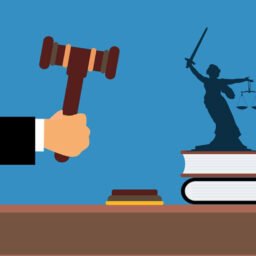Introduction
As said by O.W Holmes, “For the rational study of the law the blackletter man may be the man of the present, but the man of the future is the man of statistics.” After a lapse of 124 years, his foresight for the legal industry is now a reality. Since the advent of Artificial Intelligence (AI), there have been myriad changes in how law firms and courts of law function. Prevalent applications of AI include contract analysis, AI Chatbots, legal analytics prediction technology. As a result, there has been a substantial rise in productivity for legal practitioners and also has expedited the decision-making process. In essence, this blog highlights the need for AI in the legal profession and explains how it would alter the industry for good.
The concept of Artificial Intelligence
Artificial intelligence (AI) is defined as “a type of computer technology which is concerned with making machines work in an intelligent way, similar to the way that the human mind works.” It refers to a computer-based algorithm that can examine, analyse, and draw conclusions in order to execute jobs that would usually be completed by humans. An important component of AI is the process of Machine Learning. It involves processing data sets available and uses human feedback to derive inferences and hence the machine learns how to better respond to actions. A popular example of implementing machine learning and AI is the search recommendations on your web browser. The software analyses your past searches through AI and then come up with search results that might interest you, such as movies to watch or items to add to your shopping list.
AI in the legal industry
The legal industry is globally valued at over $750 billion[1] (approximately 5,60,00,00,00,00,000 Rupees). Artificial intelligence has the potential to significantly increase this value and effectiveness of the industry, while also assisting lawyers in making better use of the large datasets accessible to them. The applications in the legal industry have promising capabilities to enable individuals to focus upon more important tasks, relieving them of insignificant responsibilities which can be effectively and efficiently performed by AI. Naysayers argue that it is almost impossible to apply such concepts to the industry where the human intellect is the most critical element. However, they fail to recognize the fact that AI can be used to uncover formerly unknown insights that will help legal practitioners to make assessments based on statistics, and such applications will in fact amplify human intelligence. Presently, AI offers the possibility for the legal practitioner or law firm, of becoming a pioneer in terms of productivity, profitability, and efficiency. However eventually, integrating AI into the profession will be a subject of sustaining the organisation instead of prevailing over competitors.
Current challenges in the Indian legal industry
The Indian legal sector persists with their orthodox and accustomed methods and has been reluctant on integrating AI into its practices, notwithstanding the giant leap of progress that global markets have availed through artificial intelligence. The industry clings on to the labour-intensive approach and a sizeable majority remains ignorant to the AI tools specifically designed for legal applications. At the end of 2021, courts across the nation have more than 5.7 crore cases[2] pending to be heard and ruled upon. The copious paperwork at litigation offices and law firms combined with the slow decision making by the judiciary, causes a great deal of discomfort to all stakeholders involved in this process. We now look at the applications of AI and how could it mitigate the above stated problems in this situation.
Applications of AI in the Legal Industry
- Contract Analytics: Managing and supervising a contract after signing it could be a challenge to organizations and lawyers. Particularly in the context of large corporations with a large number of outstanding contracts and counterparties spread throughout several departments. Several Natural Language Processing solutions have emerged due to AI, that extract and evaluate critical information across a company’s contracts. A prominent example is Kira Systems which is an AI based engine that can discern many contract provisions with all the important information and can convert this into tables from the bulky contracts that legal practitioners would have to otherwise go through. Since its introduction, it has already been part of deals worth over $100 billion and saved up to 90% time that would have been spent manually reviewing contracts.[3]
- AI Chatbots: Chatbots have the potential to deliver legal services to a large segment of people due to the ease in accessibility and also emerge successful in providing legal assistance. These chatbots perform the automated tasks usually performed by lawyers, in order to save time and cut costs that humans would have otherwise incurred. The chatbots are excellent for speeding up the process of work while providing a better experience by allowing clients to self-serve online. DoNotPay is a famous chatbot that calls itself the world’s first lawyer robot and is a relevant example in this situation. It aids residents of New York and London to challenge parking tickets through a simple software that requisites answers to certain questions in binary, like “Was the parking sign clearly visible?” It calculates possible courses of actions that the user has through large datasets stored within the software’s algorithm. Only within two years from commencement of operations, DoNotPay has appealed parking tickets worth over $4 million and has triumphed in more than 160,000 cases taken up by the AI software. [4]
- Litigation Prediction: Prediction technology helps extrapolate outcomes of cases and determine if the case may result in a verdict in the client’s favour which in turn helps lawyers decide whether they should pursue those cases or not. Numerous litigation offices and corporations are currently using such models to better plan their litigation strategies, limit the number of lawsuits that must be brought to trial and expedite negotiations for settlement of these suits. Prediction software such as BlueJ Legal has been successful in implementing the above concepts. Its software has effectively predicted case outcomes in more than 100,000 instances while being 4 times faster and 90% accurate than conventional measures.[5]
Conclusion
Artificial Intelligence aids lawyers by reducing the amount of time it takes to undertake various tasks throughout the trial and decision-making process. The excess caseload in courts of law across this nation will inevitably diminish if the time spent in this process is reduced. The notion that AI may soon displace human lawyers is improbable since numerous cases always requisite particular discretion, conventional wisdom, as well as morality that computers still lack. While AI does not pose an imminent danger to the legal profession, it offers countless opportunities to transform and strengthen the area of law.
Author(s) Name: Bharat Manwani (Gujarat National Law University, Gandhinagar)
References:
[1] Statista Research Department ‘Estimated size of the legal services market worldwide from 2015 to 2025’ (Statista, 11 January 2022) <https://www.statista.com/statistics/605125/size-of-the-global-legal-services-market/> accessed 23 January 2022
[2] Abhimanyu Sharma, ‘Judicial vacancies, pending cases, arbitration: What SC may address in 2022’ (Times Now News, 31 December 2021) <https://www.timesnownews.com/india/article/judicial-vacancies-pending-cases-arbitration-what-sc-may-address-in/845323> accessed 23 January 2022
[3] ‘Kira Diligence Engine Exceeds $100 Billion in Transactions’ (Kira Systems, 13 July 2015)
<https://kirasystems.com/company-announcements/kira-diligence-engine-exceeds-100-billion-in-transactions/> accessed 23 January 2022
[4] Samuel Gibbs, ‘Chatbot lawyer overturns 160,000 parking tickets in London and New York’ (The Guardian, 28 June 2016) <https://www.theguardian.com/technology/2016/jun/28/chatbot-ai-lawyer-donotpay-parking-tickets-london-new-york> accessed 23 January 2022
[5] Lyle Moran, ‘Law firm teams up with Canadian legal tech company on AI-powered case prediction tool’ (American Bar Association Journal, 25 August 2020) <https://www.abajournal.com/web/article/law-firm-teams-up-with-canadian-legal-tech-company-on-ai-powered-case-prediction-tool> accessed 24 January 2022
















